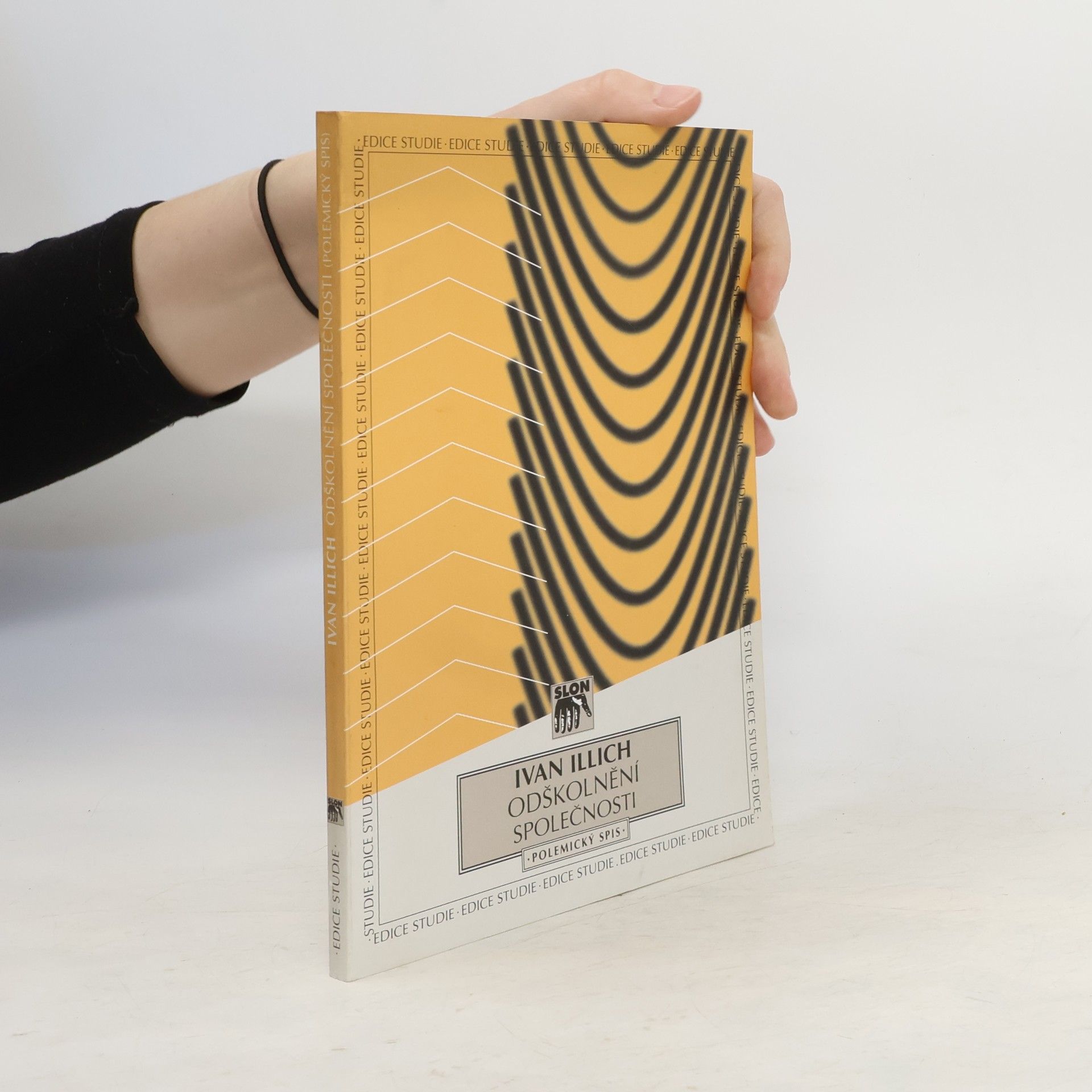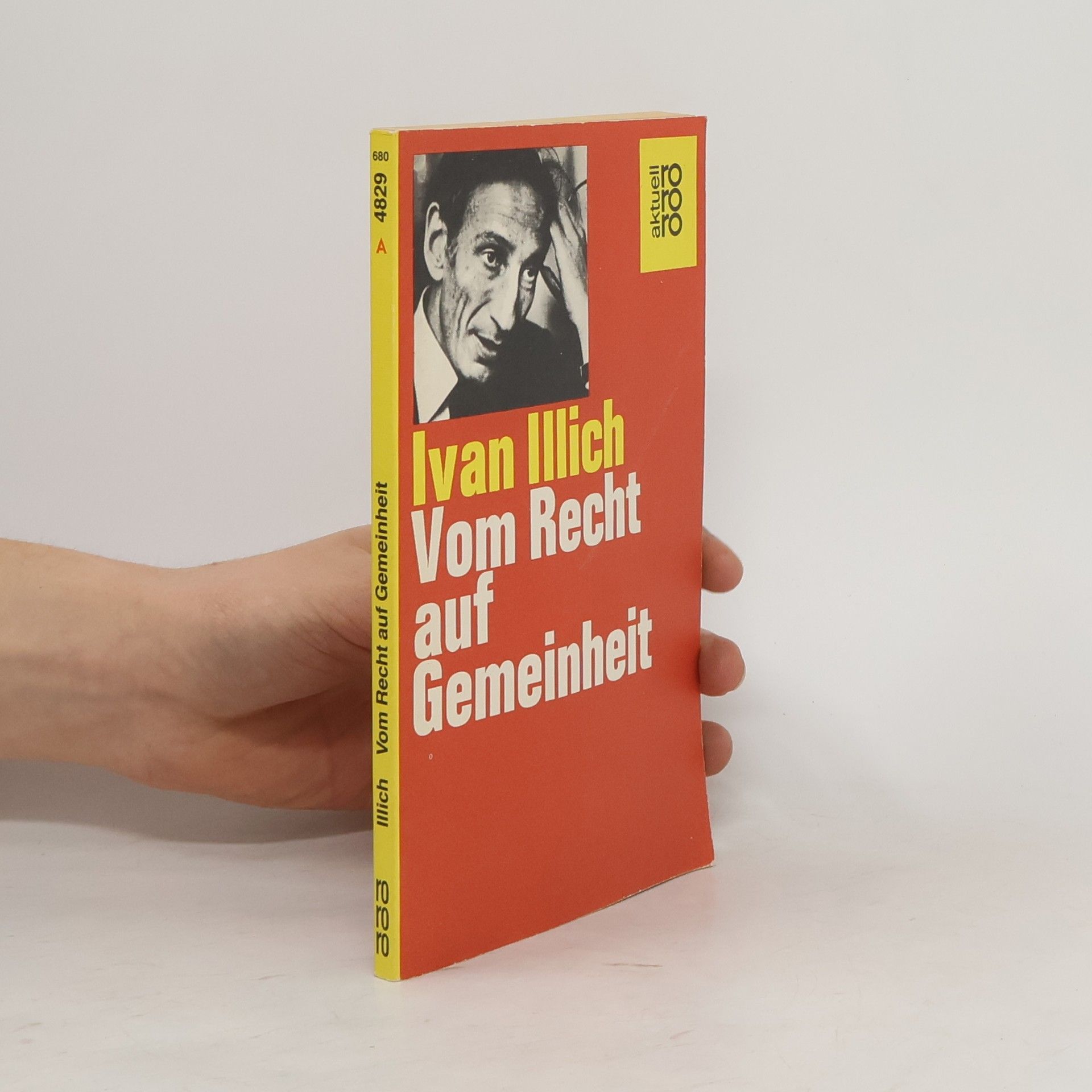Polemický spis. Školy v rozvinutých společnostech jsou podle autora vším jiným, jenom ne místem vzdělávání. Změnu této situace vidí právě v odškolněné společnosti, tedy společnosti, která zásadně změní stávající formu školy. Jedná se o dnes již klasické dílo na pomezí sociologie a pedagogiky, které může dnešním českým čtenářům přinést nemálo podnětů k přemýšlení. "Mnoho žáků, zejména chudých, intuitivně ví, co s nimi školy dělají. Učí je zaměňovat průběh a podstatu. Jakmile se tento rozdíl setře, začíná platit nová logika: čím více péče, tím lepší výsledky, neboli eskalace vede k úspěchu. Studentům je systematicky vštěpováno, aby se spokojili s vyučováním namísto učením se, postupem na vyšší stupeň školy namísto vzdělání, s vysvědčením či diplomem namísto znalosti věci a se sebevědomým projevem namísto schopnosti říci něco nového. Škola je směřuje k tomu, aby akceptovali služby namísto hodnot."
Ivan Illich Knihy
Ivan Illich byl rakouský filozof a římskokatolický kněz, který se proslavil jako kritik současných západních institucí. Ve své práci se zaměřoval na negativní dopady vzdělávání, medicíny, práce, spotřeby energie a ekonomického rozvoje na život jedince a společnosti. Illich zkoumal, jak tyto instituce často omezují lidskou autonomii a narušují přirozené způsoby učení a žití. Jeho dílo vyzývá k radikálnímu přehodnocení klíčových aspektů moderního života a k hledání alternativních, méně institucionalizovaných forem existence.







Medicínský establishment se stal významným nebezpečím pro zdraví Těmito slovy zahajuje Ivan Illich odvážný a promyšlený útok na mytickou prestiž současné medicíny, jejíž zvyklosti a rituály provozované medicínskými profesionály podrobuje kritickému zkoumání. Neúnavně a s bohatou dokumentací převzatou z uznávaných medicínských zdrojů dokazuje neschopnost medicíny ovlivnit průměrnou délku lidského života, zbytečnost mnoha postupů při léčení nemocí, rozsah škod na zdraví způsobených medicínskými zákroky a neúčinnost mnoha kontraproduktivních medicínsko-politických opatření. Illichova hluboce šokující analýza klinické a sociální reality týkající se chorob vytvořených lékaři zkoumá kulturu zdraví, nemoci a utrpení a obsahuje také historický exkurz do konceptů a obrazů smrti. Jedině uznáním základních a podstatných součástí a prvků osobního zdraví a trváním na nich, prohlašuje Illich, může člověk obnovit integritu svého organismu a svého žití. "Lidé nepotřebují byrokratické zásahy k tomu, aby se milovali, rodili, sdíleli lidské podmínky a umírali. Živoucí lidské vědomí křehkosti, jedinečnosti a vztahovosti činí ze zkušenosti bolesti, nemoci a smrti integrální část života každého člověka. Schopnost nakládat autonomně s touto triádou je základní vlastností jeho zdraví.
In the Vineyard of the Text: A Commentary to Hugh's Didascalicon
- 160 stránek
- 6 hodin čtení
Ivan Illich was a multifaceted thinker and priest whose work spanned education, social justice, and cultural critique. He established CIDOC in Mexico, a hub for his innovative ideas, and authored influential books addressing themes such as conviviality, the nature of work, and societal structures. His writings challenge conventional views on education and professional roles, advocating for a more equitable and aware society. Through his exploration of topics like gender and environmental issues, Illich's legacy continues to provoke thought and inspire change.
Deschooling Society
- 116 stránek
- 5 hodin čtení
Deschooling Society (1971) is a critical discourse on education as practised in modern economies. It is a book that brought Ivan Illich to public attention. Full of detail on programs and concerns, the book gives examples of the ineffectual nature of institutionalized education. Illich posited self-directed education, supported by intentional social relations in fluid informal arrangements.
Tools for Conviviality
- 128 stránek
- 5 hodin čtení
Ivan Illich argues for individual personal control over life, the tools and energy we use. A work of seminal importance. The conviviality for which noted social philosopher Ivan Illich is arguing is one in which the individual's personal energies are under direct personal control and in which the use of tools is responsibly limited. A work of seminal importance, this book claims our attention for the urgency of its appeal, the stunning clarity of its logic and the overwhelmingly human note that it sounds.
s/ A Call for Institutional RevolutionThe book consists of 12 essays on the following Vietnam & the resistance; the war on poverty; Latin America, Puerto Rico & immigration to the US mainland; Catholic Church problems; the Church's role in social change & development; the futility of schooling; the question of technical assistance & programs for 3rd world birth control. Each issue, while real & urgent in its own right, becomes a paradigm case which reveals a fundamental theoria/praxis of revolution, informed by a philosophical & theological discipline & sensibility which transcends, tho it cannot avoid, concrete issues in a given time & place. In each essay, Illich uses the method of radical doubt--not in a Cartesian but in a Socratic sense. He challenges the 'nature of some certainty' purveyed as truth. Hence he's dealing with 'the deception embodied in one of our institutions.' The most widespread & pernicious deception pretended as certainty he questions is the certainty of ideological liberals who assume that people make their livee by their institutions & therefore the institutions of N. American industrial civilization can & should be translated to the 3rd world for its own especially the institutions of schooling & technical assistance designed to help a given nation emulate the affluence of the US.--Richard A. Journal of the American Academy of Religion (edited)
In the Mirror of the Past: Lectures and Addresses 1978-1990
- 240 stránek
- 9 hodin čtení
Exploring Medieval history in the 1980s, Ivan Illich reveals how foundational institutions of contemporary society were established in the twelfth century. The book delves into various themes, including health, housing, education, language, literacy, peace, and ethics, offering a critical analysis of their historical development and impact on modern life.
The Powerless Church and Other Selected Writings, 1955-1985
- 192 stránek
- 7 hodin čtení
A collection of writings from Dalmatian-Austrian philosopher, Roman Catholic priest, and radical cultural critic Ivan Illich. Focuses on Illich's shorter writings from his early publications through the rise of his remarkable intellectual career, making available works that had fallen into undue obscurity.
Vom Recht auf Gemeinheit
- 134 stránek
- 5 hodin čtení

